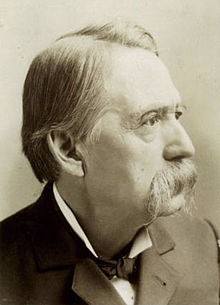Thomas Dunn English
| Thomas Dunn English | |
|---|---|
 |
|
| Member of the U.S. House of Representatives from New Jersey's 6th district |
|
|
In office March 4, 1891 – March 3, 1895 |
|
| Preceded by | Herman Lehlbach |
| Succeeded by | Richard W. Parker |
| Personal details | |
| Born |
June 29, 1819 Philadelphia, Pennsylvania |
| Died | April 1, 1902 (aged 82) Newark, New Jersey |
| Political party | Democratic |
Thomas Dunn English (June 29, 1819 – April 1, 1902) was an American Democratic Party politician from New Jersey who represented the state's 6th congressional district in the House of Representatives from 1891 to 1895. He was also a published author and songwriter, who had a bitter ongoing feud with Edgar Allan Poe.
English was born in Philadelphia on June 29, 1819. He attended the Friends Academy in Burlington, New Jersey, and graduated from the University of Pennsylvania School of Medicine in 1839. His graduation thesis was on phrenology. He studied law, and was admitted to the Philadelphia bar in 1842, but mainly pursued journalism.
English wrote scores of poems and plays as well as stories and novels, but his reputation as a writer was built on the ballad "Ben Bolt" (1843). Written for Nathaniel Parker Willis's New York Mirror, it was turned into a song and became very popular, with a ship, steamboat and racehorse soon named in its honor. American opera singer Eleonora de Cisneros recorded this on an Edison Blue Amberol cylinder in 1912.
Other works include the temperance novel Walter Woolfe, or the Doom of the Drinker in 1842 and the political romance MDCCCXLII. or the Power of the S. F. in 1846. He was the founding editor of the monthly The Aristidean in New York, which printed its first issue in February 1845. English later edited several other journals, including the humorous magazine The John Donkey, American Review: A Whig Journal and Sartain's Magazine.
...
Wikipedia
